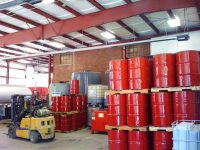TestOil conducts an end-to-end lubrication program audit of each customer’s lubrication-related operations. This audit encompasses the following areas:
- A review of storage and handling
- Selection of equipment to sample
- Selection of ideal sample points
- Selection of appropriate test packages
- Establishment of sampling frequency
1. Review of Lubrication Storage and Handling
Contrary to popular belief (and logic) new oil, no matter how it arrives-drums, totes, or tanker- is not clean. Often on delivery it is 8-16 times dirtier than the OEM recommended cleanliness level. The audit will provide recommendations for storage, handling, and testing of new oil; look for ways to prevent further contamination; and examine storage and handling practices of all oil. For example, one simple suggestion may be to ensure containers are closed tightly—possibly with the addition of breathers (many OEM breathers do not provide adequate protection).
2. Selection of Equipment to Sample
TestOil takes into account a few criteria including: criticality; expense and safety; reliability; and environment and efficiency. For details on this, please see a previous TestOil post: “How to select the equipment for a lubrication monitoring program.”
3. Selection of Ideal Sample Points
Essentially, the sample needs to be representative of the lubricant flowing through the critical components. For this reason, dead legs and stagnant areas don’t make good sample points. Following are a few sample location examples—from most to least desirable:
- A dedicated sample port installed where a sample can be pulled while the machine is running with minimal flushing, drawing from an active zone
- A dedicated sample port that either requires briefly shutting down the machine for access or extensive flushing to obtain a sample
- A sample location that is outside of an active zone and requires extensive flushing
- A sample location that is a drain at the bottom of a sump or reservoir
- A sample location that increases the potential for system contamination through its use, such as a hatch, breather, dipstick or fill cap
During the audit, TestOil will stress the importance of taking the sample the same way, every time in order to receive accurate trendable data.
4. Selection of Appropriate Tests
Factors affecting the test slate include: program goals, machine type, fluid type and operating conditions. For example, if the equipment is operating in a humid or wet environment, water content should be tested. If filtration is present, particle count needs to be included. TestOil’s experts will be a significant help in determining a customized test slate that provides an accurate snapshot of equipment health.
5. Establishment of Sampling Frequency
In the industrial world, monthly is the most common sampling frequency. But there is a variety of reasons--including a history of unscheduled downtime, equipment age, criticality and out-of-range test results--that may warrant more frequent testing. TestOil can provide recommendations grounded in experience and expertise.
Through careful evaluation and development of clearly defined goals, a TestOil lubrication program audit will lay a firm foundation for a best practice oil analysis program. Going forward, the audit will serve as a roadmap for maintaining an efficient and effective operation. To schedule a comprehensive program audit or find out more, visit: https://testoil.com/consulting-pro/. For more information on working with TestOil for oil analysis and training visit www.testoil.com, call 216-251-2510 or email sales@testoil.com.
With more than 30 years of experience in the oil analysis industry, TestOil focuses exclusively on assisting industrial facilities with reducing maintenance costs and avoiding unexpected downtime through oil analysis program implementation. As industry experts in diagnosing oil-related issues in equipment such as turbines, hydraulics, gearboxes, pumps, compressors and diesel generators, TestOil provides customers with a guarantee of same-day turnaround on all routine testing. TestOil PRO certified lubrication professionals educate the industry on oil analysis through public and private onsite training. These highly experienced professionals provide a variety of onsite services; from collecting oil samples to conducting failure analyses to writing work orders. For more information on partnering with TestOil on oil analysis programs or training opportunities visit https://testoil.com. Contact: Michael Barrett 216-251-2510; sales@testoil.com.


